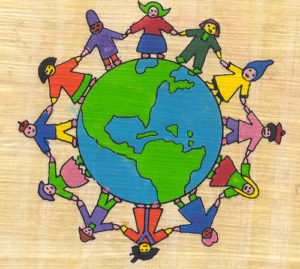One of the biggest mistakes mediocre speakers make is to keep using the same type of illustration over and over. Here are a few examples you may not have thought of before.
The Same old Mediocrity
Have you ever heard that speaker that talks about himself, and then talks about himself, and then talks about himself, and then tells you to learn something from it?
 The biggest problem with talking about yourself isn’t the fact that it’s about yourself so much as the fact that so many speakers don’t talk about anything BUT themselves.
The biggest problem with talking about yourself isn’t the fact that it’s about yourself so much as the fact that so many speakers don’t talk about anything BUT themselves.
The self-centered speaker is the one that uses personal examples, and personal examples ONLY.
The self-centered weatherman keeps making comments like:
One time I saw a tornado [or fill in another weather event] that ….
Don’t get me wrong — there is nothing wrong with that! Unless the whole weather report is non-stop reminiscing.
A public speaker that didn’t talk about herself at all would come across flat and void of personality. You need personal examples! Talking about yourself isn’t bad. In fact, a lot of speakers need to talk about themselves more.
Some mediocre speakers talk about only themselves. On the other hand, some mediocre speakers who are afraid to talk about themselves tend to avoid the personal example and rely on the historical example instead.
 They talk about famous people, famous quotes, little known historical figures, recent news, and so forth.
They talk about famous people, famous quotes, little known historical figures, recent news, and so forth.
This year’s weather is similar to the blizzard of 1982 …
There is nothing wrong with that either! Unless the whole weather report is non-stop history channel.
The history-buff speaker seems oblivious to the fact that history isn’t interesting to everyone, and it starts to sound like more of the same–the same.
Personal examples and Historical examples are both good.
Here’s a few lesser known alternatives:
Example of Humanity
Not everyone can relate to your personal story. Not everyone relates or cares about your historical example, but everyone has had a runny nose before.
There are some experiences that are universal to the human experience:
 Childhood / Aging
Childhood / Aging- Relationships
- Pain / Illness
- Sexuality
- Bodily Functions
- Mortality
- Consciousness
- Language
Is it starting to make sense why I’m using the example of a weatherman to demonstrate the five Es of illustrations?
Because experiencing weather is one of those universal human experiences.
Did you ever wonder why so many comedians and sitcoms make sex jokes and jokes about bodily fluids?
Crude or not, 100% of people understand a bathroom joke, even if they don’t think it’s funny. The bathroom experience is universal to humanity.
One of the biggest advantages of referencing our common humanity is that it lets you relate to people you have never met before and know nothing about.
Ideally, you can learn about the listener’s narrower social identity and reference that, but when you can’t know specifics, you know without even asking that the listener will understand a reference to one of the common human experiences such as pain and illness.
Our weatherman might say:
Tomorrow you may experience wind gusts over 60 miles per hour. If you go outside, watch out for that dust in your eye.
That little addendum about “dust in your eye” amps up the weather report with an illustration that any weatherperson knows every listener understands.
Using an example from humanity usually takes the form or emotional recall or analogy.
Cultural Examples
The cultural example is not universal. The cultural example is familiar only to a subset of humanity. As long as your audience shares the same culture, using cultural illustrations opens up many more possibilities than the shared human experience.

For example, do you know who Emmanuel Macron is?
Most Americans will answer no.
Every Frenchman will answer yes.
FYI: He is running for president of France. By the time I publish this, the election will be over.
It’s fairly obvious that you won’t get very far talking about French politicians in the US, but extend this beyond the obvious.
One time I was coaching a high-profile CEO, who told me about the time he was speaking in France. As an example of something common to everyone he used the example of a McDonald’s Big Mac.
The same speech in the USA earned him lots of laughs and applause. In France, not so much.
Why? Fine food is very important in French culture. Yes they have McDonald’s in France, but it’s not the same as the American version.
A Big Mac analogy in the US is about a fast-food hamburger. The French would never accept the sloppy, cheap, low quality, meat of American fast food as an acceptable common experience. French see their version of food as better — not sloppy, not cheap, not low-quality. The same analogy about the French Big Mac (“MacDo”) makes no sense.
Culture includes celebrities, cliches in language, religion, local organizations, food, etiquette, geography and so forth.
My coaching is decidedly US-centric, so I might help a US weatherman add a US-centric reference to the weather report:
In Portland tomorrow it’s going to feel like summer in Florida!
You only understand if you know US geography and climate.
Hypothetical Examples
And now my favorite–make it up. Your example doesn’t have to be real. In fact imaginary examples are often even more effective than reality, because in the listener’s imagination anything can happen.
These type of examples often begin with the word “imagine.”
Imagine the perfect weather, 80 degree sunshine, barely a slight breeze, partly cloudy with only occasional shade … tomorrow’s weather will be nothing like that. Expect 45 degree rain all day.
You can ask your listener to imagine anything just like any good car salesman helps you imagine what it will be like to own a new car.
Where are you going to drive this car?
That’s a hypothetical example, asking you to imagine the outcome the salesman wants, but that its not yet reality.
Imagine falling down Alice in Wonderland’s rabbit hole …
 The hypothetical allows you to invite the listener to go anywhere, and when they go somewhere in their head, it’s even more powerful than the real thing.
The hypothetical allows you to invite the listener to go anywhere, and when they go somewhere in their head, it’s even more powerful than the real thing.
In imagination, you can experience your worst nightmares and your greatest dreams “hypothetically.”
Beyond Mediocrity
If you don’t want to sound mediocre, use all of the different types of examples:
- Personal
- Historical
- Human
- Cultural
- Hypothetical
Even better use all 5 Es of illustration:
- Explanation
- Evidence
- Endorsement
- Example
And one more to be discussed next week.


One thought on “5 Illustrations Mediocre Speakers Don’t Know: Example”
Comments are closed.